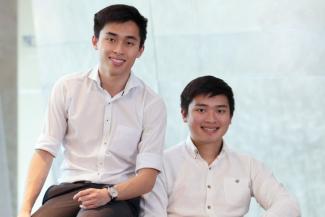
Brothers Nicholas and Jonathan Han run an online retail startup that customises timepieces. They received seed funding through the Institute of Innovation & Entrepreneurship at SMU reported The Business Times.
But university undergraduate Nicholas Han, 25, and his brother Jonathan, 22, had to take some sneers and derisive laughter along with that as well.
Nicholas, 25, recalls the trip they made to Hong Kong, where they told some big suppliers about their plan to set up a watch company selling customised timepieces and were laughed off, "maybe because we look young".
"We told a supplier we were going to inscribe certain details like a person's signature onto the timepiece, and he asked: 'How are you going to do that? Are you going to use your own pencil to write it on?'"
Schaffen was incubated at the Institute of Innovation & Entrepreneurship (IIE) of the Singapore Management University (SMU), which has given the brothers access to key investors.
The brand's website was launched last October, and to date, counts 15 per cent of its sales from beyond Singapore - Italy, Belgium, Switzerland and the US.
The brothers' journey began when Jonathan struggled to find a timepiece for his 21st birthday that ticked all his boxes. His efforts took him and his brother to the Hong Kong Trade Development Council (HKTDC) Watch & Clock Fair, where they met watchmakers and suppliers.
Jonathan eventually dedicated the finished timepiece to his father. The watch, with the older Mr Han's signature and name inscribed on the dial, caught the attention of friends and family, who began asking for personalised timepieces.
When Nicholas and Jonathan saw this as a business idea, they again visited Hong Kong, where they met 40 suppliers over two days.
Last year, they made their pitch to the IIE at SMU, where Nicholas is a final-year student. In the months following their acceptance into the programme, they raised S$100,000 through angel investors, including their mentor Virginia Cha, a veteran tech entrepreneur.
The seed funding enabled them to make a minimum order for supplies and to hire two watchmakers, who now work out of a workshop in Jurong.
Materials shipped from abroad include Italian full-grain calf leather straps, sapphire crystal glass, Rhonda Calibre 762 Swiss quartz movements and in-house designed 316L stainless steel cases with a sand-blasted matte side and polished bezel.
Each watch retails at S$299, a competitive price achieved by cutting out middlemen in the supply chain, said Nicholas.
Jonathan said: "Not many companies offer the level of customisation that we do. Oftentimes, it's only the straps or the dial colour that can be chosen."
Tertiary-level students find Schaffen's price affordable, but the brand's biggest customers are older watch buyers looking for something different to add to their collection.
Nicholas said: "We once had a Swiss customer who inscribed 'King of Cool' on his dial."
Through the IIE, the pair gained access to key advisers - Raphael Dana, a serial entrepreneur previously based in Switzerland, and Ashok Miranda, formerly a creative director at Walt Disney South-east Asia, both of whom helped the brothers define their revenue model and marketing strategy.
Nicholas said: "I think digital marketing is going to determine how brands play in the future." He added that the online market is no longer geographically distributed, making it possible for a European Instagram account to have a majority of its followers in Asia, for example.
The startup is looking into working with overseas partners to extend their international reach. It has a current headcount of six, but plans to grow this to between eight and 10 by year's end to focus on marketing.
Schaffen is also in talks to get its watches displayed in the gallery in K+ at Scotts Orchard. In the meantime, potential customers can look forward to two Swiss automatic-movement models this year.
"One will have a classic dress watch design, and the other, a sporty Gerald Genta-inspired design," said Jonathan, referring to the renowned Swiss watchmaker. The automatic watches will retail at between S$700 and S$800.
"What really drives me is when customers tell us how unique and perfect their timepieces are. This gives me the validation that we're creating value for people, and this is what continues to drive us."